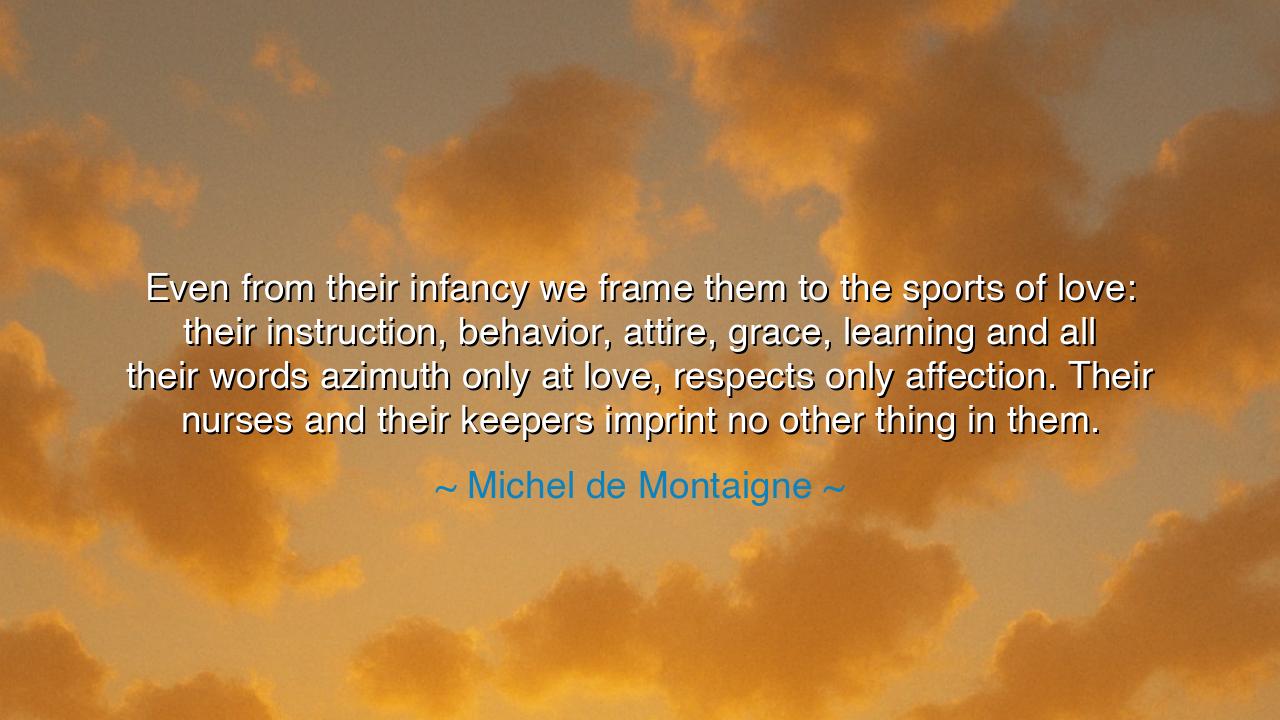
Even from their infancy we frame them to the sports of love:
Even from their infancy we frame them to the sports of love: their instruction, behavior, attire, grace, learning and all their words azimuth only at love, respects only affection. Their nurses and their keepers imprint no other thing in them.






In the reflective and penetrating words of Michel de Montaigne, the Renaissance philosopher whose wisdom still ripples through the centuries, we find a truth about the shaping of the human heart: “Even from their infancy we frame them to the sports of love: their instruction, behavior, attire, grace, learning and all their words azimuth only at love, respects only affection. Their nurses and their keepers imprint no other thing in them.” These words, drawn from his Essays, are not mere observation but lament — a lament for how society molds the young not toward wisdom or virtue, but toward desire and vanity. Montaigne, a man who sought the honest knowledge of the soul, saw clearly how early our hearts are bent toward the pursuit of love, not as something sacred and profound, but as a game of appearance and approval.
To frame them to the sports of love, he says — from infancy, we shape our children’s minds not for truth, but for performance. The child, still unknowing of the world, learns quickly to seek affection through beauty, charm, and flattery. The mother praises her daughter’s grace; the father boasts of his son’s gallantry; the nurse hums songs of romance to the cradle. Thus, even before reason awakens, the heart is taught to yearn for admiration rather than understanding. Montaigne saw in this a great danger: that the soul, instead of growing toward its higher self, becomes enslaved to the eyes of others.
The ancients too warned of this. Plato, in his Republic, spoke of the need to guide the young toward temperance — to teach them to love not with passion’s blindness, but with wisdom’s light. He feared that when society honors beauty above virtue, it breeds hearts restless and shallow. And indeed, Montaigne’s world — like our own — was one where appearances ruled the heart. The courtiers of his time measured worth by grace and charm, where learning was twisted into ornament and love became sport rather than sacred bond. He saw in this a mirror of human folly: that we train the soul to dance before it learns to walk.
Consider the story of Madame de Pompadour, the celebrated mistress of King Louis XV. From her youth, she was instructed not in philosophy or virtue, but in the arts of beauty, wit, and seduction. She mastered them so completely that she rose to the highest court in France, ruling hearts and policies alike through charm. Yet behind her elegance lay a tragedy: she was adored but not understood, admired but not fulfilled. She had been framed, as Montaigne warned, for the sports of love, and thus her worth — though glittering — was bound to fade with the passing of time. Her life, like so many shaped in the same mold, was both brilliant and bound.
Montaigne’s words reach beyond gender or age; they speak to how society imprints desire upon the human heart. From our earliest days, we are told that love is the measure of success — that to be desired is to have value, and to be unloved is to be invisible. We chase affection as though it were salvation, and in doing so, we forget to cultivate solitude, purpose, and inner peace. When all of life’s “learning, attire, and grace” point toward affection, the soul becomes dependent upon the gaze of others — and the one who depends on another for worth has not yet learned freedom.
Yet Montaigne’s reflection is not only critique; it is also a call to awakening. He invites us to look upon this conditioning and see how deeply it shapes us, and then — with courage — to unlearn it. True love, he suggests, is not a performance but a harmony born of self-knowledge. The one who has matured beyond the games of affection no longer seeks to please but to understand, to honor the sacred bond between souls rather than the fleeting shimmer of approval. To teach this to our children is to restore balance to the heart.
So, let this be the lesson passed down: raise the young not for admiration, but for authenticity. Teach them that beauty fades, but wisdom endures; that affection is a gift, not a goal; that self-respect is the soil in which love must grow. Let their instruction and their learning aim not only at the games of desire but at the grace of understanding — for the heart that knows itself is free to love without losing its strength.
Thus, the wisdom of Montaigne remains as urgent today as it was in his age: “Even from their infancy we frame them to the sports of love.” Let us, then, cease framing them for performance, and instead awaken them to truth. For when the young are taught not only to seek love but to be worthy of it through virtue and depth, then love ceases to be sport — and becomes, at last, a sacred act of the soul.






AAdministratorAdministrator
Welcome, honored guests. Please leave a comment, we will respond soon